Spotlight

HICARE School-One of a Kind
Fauzia Sultana
Photos: Kazi Tahsin Agaz Apurbo
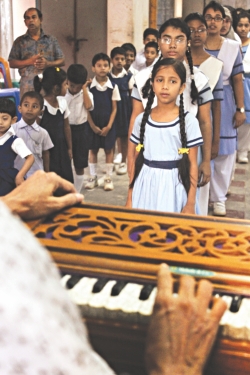 |
Students start their day at school with the assembly. |
While passing HICARE School early morning, one will hear children singing the national anthem, their tunes somewhat cacophonic. But when the passer-by sees these students, dressed in white and blue uniforms, he or she will surely witness the same spirit and the same enthusiasm in them as anyone else would while singing the national anthem.
When four month old Shama (not her real name) was attacked by typhoid, everything for her family turned topsy-turvy. The consequence--Shama was left with a hearing impairment. Hearing or auditory sense is one of the five senses with which we communicate and express ourselves. It is sometimes due to illnesses and sometimes by birth that people suffer hearing loss. Helen Keller once said “…The problems of deafness are deeper and more complex, if not more important than those of blindness. Deafness is a much worse misfortune. For it means the loss of the most vital stimulus-- the sound of the voice that brings language,…, and keeps us in the intellectual company of man.” Her words are undeniably true, for deafness separates us from people and consequently from knowledge. Often the affected parents bear a misconception in mind that because their children cannot hear, they are speech impaired as well, and they end up communicating with them through sign language, regardless of whether the child has speech impairment at all. But Shams-Ul-Haque thinks differently. “I have a profound hearing loss. In spite of that, if I can talk, why can't the others?” With a view to providing the scope for developing speech and language, HICARE School embarked upon to help the hearing impaired, develop speech and communicate like the rest.
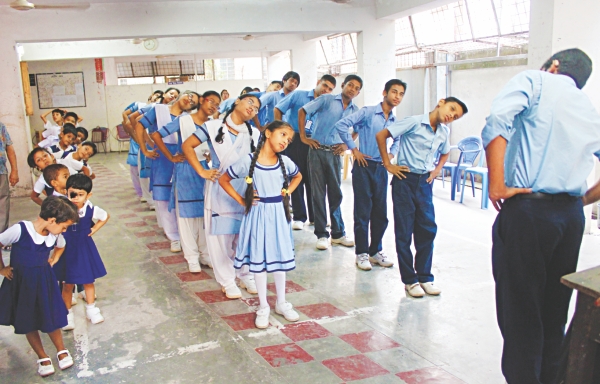
Besides regular classes, physical training is also a part of the routine.
“Sign language is the oldest and probably the most common means of communication for the hearing impaired, the world over. A hearing impaired person remains speech impaired simply because he/she cannot hear. But if the person is trained to develop speech,even the hearing impaired can talk,” says Shams-Ul-Haque, Principal, HICARE School. With staunch determination to help the hearing impaired overcome their disability, Sham-Ul-Haque started HICARE School, located in Dhanmondi, Dhaka, in the year 1982, along with the help of a few generous others. Starting with only 6 students in a single room, HICARE School has been continuing to conduct special educational programmes and till date has twelve branches in different parts of the country, with over 350 students and 65 teachers. HICARE School is the first school in Bangladesh to help the hearing impaired children develop speech through 'Auditory Oral Method'.
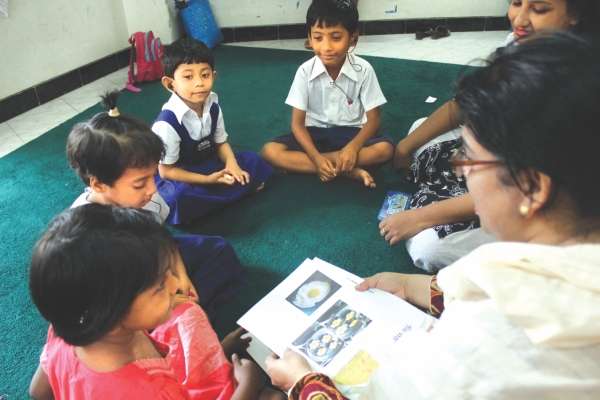
Naming objects is one of the many preschool activities.
In Auditory Oral Method, the child is first diagnosed by an audiologist to find out the level of hearing loss. “At HICARE Audiological Test Centre, even a new born baby can be tested for audibility,” says Kaniz Fatema, Chief Audiologist and Incharge, HICARE School. “Depending on the level of hearing loss, the child is given a hearing device to bring his or her hearing to the audible range,” she adds. The child is then enrolled to the school and trained to develop speech and language.
 |
The school helps hearing impaired children develop speech. |
Like any other school, HICARE School has preschool, primary, secondary and high school sections. But unlike other schools, its priority is to train the hearing impaired children to develop speech. Starting their day with the national anthem, the students engage themselves in various activities designed by the school authority. Children reciting rhymes, times tables, or simply making sounds with their mouth exercise-- AA EE OO-are what one can hear echoing from the classrooms. The Preschool section, for children aged 2.5-4, is to habituate them to wear the hearing aid and communicate with their teachers. Short words, colouring, names of objects are what they learn in preschool. Julekha Begum, Vice Principal, HICARE shares, “In Primary section, the children are engaged in various activities like puzzle solving, rhymes, sound activities. They converse amongst themselves on themes and are familiarised with short sentences.” Julekha Begum has been working in this institution for the past 24 years and wishes to continue teaching the hearing impaired, for she finds joy and satisfaction in it, despite her limited earnings.
With no more than six students and a teacher, each class is designed with a mix of both severe and profound hearing impaired students. “The severe hearing impaired students can pick up lessons better and faster than the profound ones. This builds a sense of competition among the profound students and as a result they too tend to learn faster,” says Julekha Begum. According to Mary Courtman-Davies, a specialist in speech and language for the deaf, the hearing impaired needs to hear a word at least 86,000 times to say it, and often parents lose their patience because of the lengthy, repetitive process. However, once the hearing impaired starts to pick up the words and develop speech, the pace of learning increases by a few folds.
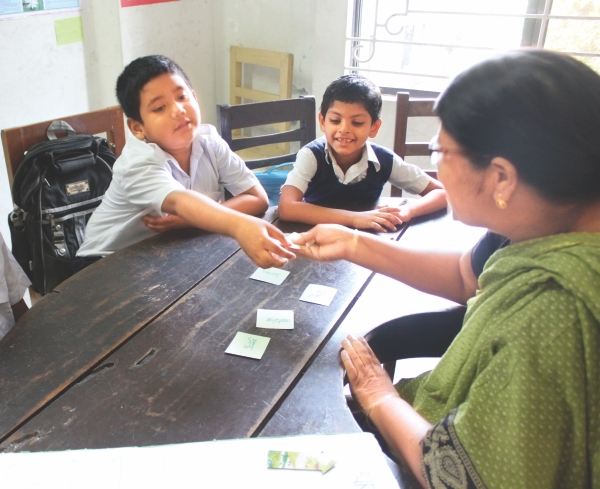
Students are involved in interactive activities to develop speech and language.
 |
Students are encouraged to be vocal in class. |
Besides speech development, students are also taught various subjects including Math, Bangla, and English and are given vocational trainings as per the National Board Curriculum. On asking what her favourite subject is, Hamida Akhter Nithi shares, “I like Bangla because it is through this language that I can express my feelings and thoughts to the rest of the world. However, I find Economics very tough because it has a lot of theories.” Nithi is a class ten student and has taken the first semester exam on five subjects under the Open University, Bangladesh curriculum. She will soon take the rest of the exams and move to class 11.
While a normal child needs a year to develop speech, it takes around 2.5-3 years for the hearing impaired. However, there are a few proactive students who respond to the training faster and communicate more efficiently than the rest. In cases as such, parents are informed by the school authority about their children's improvement and also suggest that their children can be enrolled to the main stream schools.
It is inspirational and at the same time overwhelming to see how these students, despite their limitations struggle to equal themselves to the main stream population and turn into able and wanted individuals in this competitive society. Nowshin was enrolled in HICARE School at the age of three and has been trained to develop speech for seven years. Her progress at HICARE School being significant, she was moved to Badrunnesa Girls School. She completed her SSC from there, accomplishing a Golden GPA 5.0, and not to forget a GPA 5.0 in her HSC exams as well. “Nowshin aspires to be a computer engineer and is currently preparing for the admission tests,” share her parents who are both professors at the Institute of Nuclear Medicine and Ultrasound, PG Hospital.
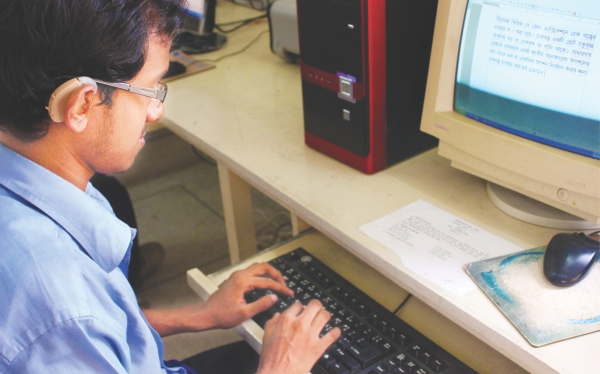
Students are also acquainted with IT skills at HICARE School.
In spite of the financial constraints that the institution has been facing for the past 29 years, HICARE School continues to maintain its standard in providing education for the betterment of the hearing impaired. However, what's alarming is that despite the institution's honest initiative for the welfare of the hearing impaired, HICARE School has not been recognised by the government.

Students of Class Ten who will soon take their SSC Exams.
In our society the impaired are considered to be a burden and are thus neglected upon, often forgetting the fact that they may be as able and full of potential as the rest. Where thousands of children in our country do not have the privilege of attending school only due to financial crisis, it is not a surprise to find the government taking no measures for the well being and education of the physically or mentally impaired. But when one says aloud, “Shobar Jonno Shikkha” (education for all), it does stir up the thinking minds. HICARE School is the initiative of such thinking minds. Our children may be born with impairment, but it is us who have to guide them to the right path and enable them to break free from all shackles of disability!
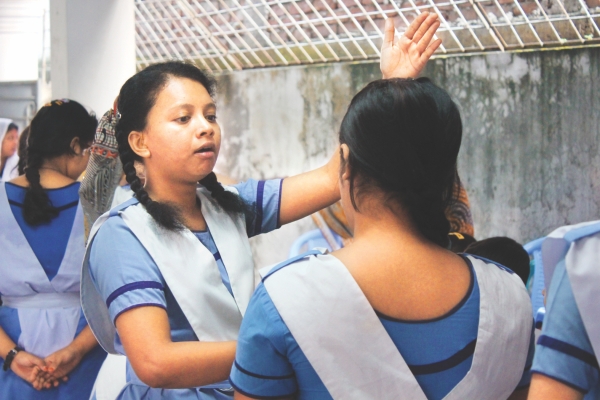
Students communicating and socialising during breaks.
|
|
|
